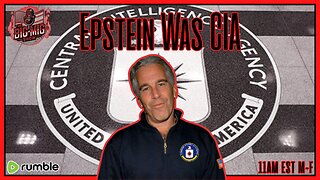Premium Only Content

Episode 3218: Guarding the Tongue: Speech and Silence
www.catholic-reboot.com
Nightly Zoom Coordinates for Rosary:
Meeting ID: 865 8978 0399
Passcode: Wjjv4960!
Speak Lord for your Servant is Listening
Book Recommendation of the Day
“Backbiting Tongue” by Fr. Jacques-Philippe Belet
This is more recent than the Fathers or Popes, but specifically addresses the sin of detraction (often called “backbiting” or “telling faults without necessity”). It’s a helpful devotional-theological work to see how the tradition treats the sin.
Although we live in a time of great dysfunction, division, and confusion, we must not let the chaos of the world rob us of our peace. Do not lose sleep over it, nor react in fear or anger, for all of this will one day pass away. Instead, keep your eyes fixed on Christ, who is the same yesterday, today, and forever. Focus on the one thing necessary your own sanctification through prayer, sacrifice, and fidelity to His Church. Kingdoms rise and fall, ideologies come and go, but our eternal reward does not fade. What endures is the soul purified in grace and the crown of glory promised to those who persevere to the end.
So I want to discuss something that I truly battle with and is always in my confessions. What I say about others and how I need to control my tongue because it truly is a the sin of Detraction.
What is the Sin of Detraction?
Detraction is a sin against the Eighth Commandment “Thou shalt not bear false witness against thy neighbor.” While calumny (or slander) is telling lies about someone, detraction is telling the truth in a sinful way.
To put it simply: detraction means revealing another person’s real faults or sins without a just cause, thereby harming their good name.
Example:
• If someone has repented of a sin but you reveal it to others who have no need to know, you commit detraction.
• If you share another person’s weakness true but hidden in a way that damages their reputation, that is detraction.
Why It Is Sinful
1. Charity is violated. We are commanded to love our neighbor. Destroying their reputation through unnecessary revelation is a failure of love.
2. Justice is violated. Every person has a right to their good name unless the common good or justice requires otherwise.
3. It causes scandal. Others may be led to think less of the person or even sin themselves by rash judgment.
Distinction from Other Sins of Speech
• Calumny (Slander): Saying something false about another to harm them.
• Detraction: Saying something true, but without just cause, and to the harm of another’s reputation.
• Gossip: Idle talk that may involve either detraction or calumny, but also includes useless chatter that distracts from charity.
When It Is Not Detraction
There are cases where revealing another’s faults is not detraction, if it is done for a just and proportionate reason:
• For the sake of justice (e.g., in a court of law).
• For the protection of the innocent (e.g., warning someone about a dangerous person).
• For correction (e.g., speaking to a spiritual director, confessor, or superior who can address the matter).
But outside of these situations, to reveal another’s faults needlessly is sinful detraction.
Scripture and Tradition
• Proverbs 11:13: “He that walketh deceitfully revealeth secrets: but he that is faithful concealeth the thing committed to him by a friend.”
• St. Thomas Aquinas taught that detraction is a mortal sin when it causes serious harm, because reputation is one of man’s greatest possessions after grace itself.
• The Catechism of the Catholic Church (CCC 2477) explicitly condemns detraction: “He becomes guilty… of detraction who, without objectively valid reason, discloses another’s faults and failings to persons who did not know them.”
Summary:
Detraction is the sin of revealing another’s real faults without necessity, thereby harming their reputation. It is not lying, but it is still grave, because it destroys charity, violates justice, and wounds the communion of souls in the Body of Christ.
Guarding the Tongue: Speech and Silence
Segment 1: Sayings of the Fathers on Speech
The Desert Fathers were uncompromising about the dangers of the tongue. For them, careless speech was not a small imperfection it was a spiritual wound that could corrupt the soul and damage the community.
• Abba Arsenius, who had once been a tutor to the sons of the Roman Emperor, left the wealth and honor of the court for the silence of the desert. His most famous prayer was short and direct:
“O Lord, teach me to be silent.”
Imagine: a man trained to speak with wisdom in the palace of Caesar begging God to unteach him the habit of constant speaking. He later confessed:
“I have often repented of speaking, but never of being silent.”
This shows us the value of restraint words spoken can never be recalled, but silence can always be broken when the time is right.
• Abba Poemen gave one of the deepest teachings:
“A man may seem to be silent, but if his heart is condemning others, he is babbling ceaselessly. True silence is of the heart.”
The Fathers were not content with external quiet. For them, authentic silence was interior freedom from judging, gossiping, or condemning others in thought.
• Abba Agathon, a man known for his gentleness, said something striking:
“A man who is angry, even if he raises the dead, is not acceptable to God. So too the man who speaks carelessly.”
Even miraculous works mean nothing if they are accompanied by anger and reckless words.
These sayings reveal that the Fathers saw speech as a spiritual act. Every word either sanctifies or corrupts. Every silence either opens the heart to God or hides unspoken judgment. They weighed words as though they were gold, and they feared carelessness as though it were poison.
Segment 2: Why This is Relevant Today
We live in a world of verbal excess. Never in history have so many words been spoken, posted, or shared in so little time. Technology has multiplied our ability to speak without multiplying our wisdom in speaking.
1. A World of Noise
Our age is drowning in chatter. Social media thrives on instant reactions. Talk shows fill hours with endless speculation. Parishes can sometimes echo this same problem long after Mass, parking lots and vestibules become places of idle talk rather than recollection. The Desert Fathers would see this as spiritual wastefulness.
2. The Sin of Gossip
Gossip is no small matter. It is a direct attack on charity. St. James compares the tongue to a fire that sets forests ablaze (James 3:5–6). The Fathers agreed: gossip may seem small, but it destroys reputations, divides communities, and kills souls. Today, gossip has found a new home online the “digital desert” where reputations can be ruined with a single careless comment.
3. The Loss of Silence
Our culture fears silence. We fill every empty moment with noise: music in the background, podcasts, scrolling, constant messages. But if we cannot endure silence, how can we ever hear the still, small voice of God?
4. The Temptation of Rash Speech
The speed of communication encourages thoughtless words. Online debates, parish disputes, even conversations among friends often reveal the tendency to speak before thinking, to respond before praying.
This is why the Desert Fathers’ warnings are more urgent now than ever. Their message reminds us that words are not disposable. They form our souls, shape our communities, and weigh on our judgment before God.
Segment 3: Remedies from the Desert Tradition
The Fathers were not content to warn; they offered remedies concrete practices to tame the tongue and cultivate silence.
1. Love of Silence
Abba Isaiah said:
“When you love silence, you will draw near to God, and in your silence He will draw near to you.”
Silence was seen as a holy space where God speaks. For modern Catholics, cultivating love of silence could mean beginning and ending each day with a few minutes of wordless prayer before God.
2. Guarding the Tongue
The Fathers practiced restraint. They spoke little and only when necessary. Their words were deliberate, short, and charitable. The Rule of St. Benedict echoes this: “If you have something to ask, do so humbly and with all quietness.” Imagine if every parish adopted this practice before and after Mass how much more recollected and prayerful our worship would become.
3. Examination of Words
Before speaking, the Fathers asked:
o Is it true?
o Is it necessary?
o Is it charitable?
If the answer was “no” to any of these, the word was left unsaid. This practice could transform not only our conversations but our online presence.
4. Scripture as a Guard
They frequently prayed Psalm 140:3:
“Set a guard, O Lord, over my mouth; keep watch over the door of my lips.”
Repeating this verse can become a shield whenever anger or gossip tempts the tongue.
5. Practical Ascesis
They saw restraint of speech as a form of fasting:
o Limiting idle conversation.
o Creating quiet hours in the home without TV, radio, or chatter.
o Confessing sins of speech regularly.
Just as we fast from food, we can fast from unnecessary words.
Segment 4: The Fruits of Holy Silence
The Fathers insisted that silence bore fruit in the soul:
• Peace — Gossip and chatter scatter the mind; silence gathers it. A quiet soul is a recollected soul.
• Charity — When we refuse to speak against others, our hearts are softened with compassion rather than hardened by judgment.
• Prayerfulness — Silence makes space for God’s Word. Christ Himself often withdrew into silence to pray.
• Holiness — St. James tells us: “If any man offend not in word, the same is a perfect man.” (James 3:2). Mastery of the tongue is a mark of spiritual maturity.
In silence, the Fathers found not emptiness, but fullness. Silence was not absence but presence the presence of God filling the heart once idle words were stripped away.
Conclusion: The Eternal Weight of Words
The Desert Fathers remind us that our words are never wasted. They either serve God or they serve sin. Christ Himself said:
“By thy words thou shalt be justified, and by thy words thou shalt be condemned.” (Matthew 12:37).
In a world drowning in noise, gossip, and careless speech, we must recover their wisdom. To guard the tongue is to guard the heart. To love silence is to love God. To measure our words is to measure our souls against eternity.
As Abba Arsenius said:
“I have often repented of speaking, but never of being silent.”
Let us take his wisdom to heart.
Epistle Reflection (Hebrews 10:32–38)
"Call to mind the former days, wherein, being illuminated, you endured a great fight of afflictions… But my just man liveth by faith; but if he withdraw himself, he shall not please my soul."
St. Paul exhorts the faithful Hebrews to remember the zeal and courage they first showed after their conversion, even in the face of trials, public insults, and confiscation of their goods. He reminds them that perseverance is required if they are to receive the promise of eternal life.
For us today, the temptation to compromise is strong. We may not always suffer open persecution, but subtle pressures abound: to water down the faith, to embrace relativism, to accept the world’s standards instead of God’s law. Like the Hebrews, we must hold fast. “My just man liveth by faith.” That faith is not a mere sentiment but a virtue that clings to God’s truth even when everything else seems uncertain.
The Epistle calls us to courage: not to shrink back when confronted with ridicule, difficulty, or loss, but to remain faithful as soldiers of Christ.
Gospel Reflection (Matthew 24:3–13)
"See ye not all these things? Amen I say to you, there shall not be left here a stone upon a stone that shall not be destroyed… But he that shall persevere to the end, he shall be saved."
The disciples ask Our Lord about the end of the world and the signs of His coming. Christ speaks with solemnity: false prophets will arise, nations will war, charity will grow cold, and many will be scandalized. Yet He concludes with the great promise: “He that shall persevere to the end, he shall be saved.”
This Gospel is both a prophecy of the destruction of Jerusalem in A.D. 70 and a foretelling of the last days. For us, it is a wake-up call. We live in times when many are deceived, when love grows cold, and when the Church herself is shaken by internal crisis. But Christ has already told us these things would come. The command is clear: watch, remain steadfast, do not be deceived.
Here we see the harmony with the Epistle: faith and perseverance are required. Trials will come, the Church will be purified, but the promise remains — those who endure to the end in fidelity to Christ and His Church will be saved.
Feast of St. Januarius and Companions
Today the Church also honors St. Januarius, Bishop of Benevento, and his companions, who were martyred during the Diocletian persecution. St. Januarius is renowned not only for his martyrdom but also for the miraculous liquefaction of his blood, which continues to this day in Naples as a sign of God’s power and a testimony to the truth of the faith.
The example of St. Januarius and his companions is a perfect illustration of today’s readings. They endured trials, refused to compromise, and persevered even to death. In them we see the living proof that “the just man lives by faith,” and that endurance in Christ leads to eternal glory.
Concluding Prayer
Let us pray:
O God, who didst adorn the holy bishop and martyr St. Januarius with invincible constancy in faith and love, grant that we, strengthened by his intercession, may persevere amid the trials of our time and remain steadfast until the end. Give us courage, Lord, to endure reproach and loss, to cling to the Cross of Thy Son, and to remain faithful to Holy Church until we see Thee face to face in eternal glory.
Through the intercession of Our Lady, Queen of Martyrs, may our faith never waver, our hope never fail, and our charity never grow cold. We ask this through Christ our Lord. Amen.
Closing
Thank you for joining us today. May the words of Scripture and the witness of the martyrs strengthen you in your walk with Christ. Remember: he that shall persevere to the end, he shall be saved. Go forth with faith, with courage, and with peace.
-
 LIVE
LIVE
Steven Crowder
2 hours ago🔴 They Are Lying Because They Are Losing: ICE Shooter, White People, & ... Bees?
71,519 watching -
 LIVE
LIVE
The Rubin Report
36 minutes agoGavin Newsom Humiliates Himself on Colbert by Saying This Live On-Air
1,742 watching -
 LIVE
LIVE
Right Side Broadcasting Network
1 hour agoLIVE: President Trump Greets Turkey’s President Erdogan - 9/25/25
1,181 watching -
 LIVE
LIVE
Benny Johnson
1 hour agoPANIC: James Comey Indictment IMMINENT, Faces PRISON | Letitia James, John Bolton Next, Trump CURSE
6,821 watching -
 1:00:18
1:00:18
VINCE
2 hours agoHow Many More Tragedies Before A Change Is Made? | Episode 133 - 09/25/25
73.4K47 -
 LIVE
LIVE
LFA TV
17 hours agoBREAKING NEWS ALL DAY! | THURSDAY 9/25/25
4,467 watching -
 DVR
DVR
theoriginalmarkz
1 hour agoCoffee with MarkZ. 09/25/2025
2.08K -
 LIVE
LIVE
Badlands Media
6 hours agoBadlands Daily: September 25, 2025
4,069 watching -
 LIVE
LIVE
The Big Mig™
2 hours agoEpstein Was CIA & Who Is Trump Protecting?
6,091 watching -
 LIVE
LIVE
Chad Prather
45 minutes agoChristian Youth Coach SHOT In Texas While Praying W/ Team! + Megyn Kelly DESTROYS Libs On TPUSA Tour
490 watching